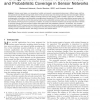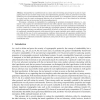719 search results - page 60 / 144 » Proving Security Protocols Correct |
DEXAW
2009
IEEE
15 years 11 days ago
2009
IEEE
Although information sharing in supply chain management dramatically reduces costs, parties are reluctant to do so, mainly due to fear of information leakage. Solutions based on se...
TPDS
2010
14 years 9 months ago
2010
—Various sensor types, e.g., temperature, humidity, and acoustic, sense physical phenomena in different ways, and thus, are expected to have different sensing models. Even for th...
SRDS
2003
IEEE
15 years 4 months ago
2003
IEEE
Group communication protocols constitute a basic building block for highly dependable distributed applications. Designing and correctly implementing a group communication system (...
WECWIS
2005
IEEE
15 years 4 months ago
2005
IEEE
A zero-knowledge proof (ZKP) is an interactive proof that allows a prover to prove the knowledge of a secret to a verifier without revealing it. ZKPs are powerful tools to deal wi...
ESORICS
2006
Springer
15 years 3 months ago
2006
Springer
Abstract. Simulatability has established itself as a salient notion for defining and proving the security of cryptographic protocols since it entails strong security and compositio...


